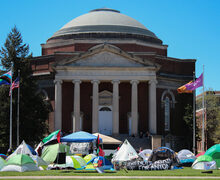Syracuse Stage puts on ‘The Quarrel’ for Holocaust Remembrance Week
After the Holocaust, many Jewish survivors lost their faith in God because of the hurt they endured after losing so many loved ones.
‘The Quarrel,’ a play by David Brandes and Joseph Telushkin, follows two Jewish Holocaust survivors who reunite for the first time in 15 years to discuss their struggles with faith and God.
The play is sponsored by the Chabad House and falls during Holocaust Remembrance Week. Actors will meet with the audience to discuss the play following the performance.
‘The play touches on the very essentials,’ Rabbi Yaakov Rapoport of the Chabad House said. ‘There are questions concerning God and we’re dealing with two men, two survivors who take up an argument they had long before.’
Both survivors lost their entire family to the Holocaust.
For Hersh Rasseyner (Reuven Russell), an Orthodox rabbi living in Montreal, the experience bolstered his faith in God until it was all he had. Meanwhile, the Holocaust killed whatever faith Chaim Kovler had. While dealing with his disappointment in God, Kovler (Sam Guncler) lives as an agnostic Yiddish writer in New York.
Both men were best friends as children in Bialystok, Poland. They discover each other by chance in a Montreal park three years after World War II in 1948. The story and setting are simple, allowing the plot to focus more on the two friends and their beliefs, Rapoport said.
‘At Sinai,’ Chaim said. ‘God made a covenant with the Jewish people. At Auschwitz, he broke it.’
‘It wasn’t God who built Auschwitz,’ Hersh said, ‘it was man.’
Brande’s 1992 screenplay is adapted from Yiddish writer Chaim Grade’s short story titled ‘My Quarrel with Hersh Rasseyner.’ The story was published in 1956, while the film was released in 1993. Reviews have described the play has as a ferocious debate between the religious and secular world.
Rapoport said the original story recounts the two friends meeting once in Paris after the war. In the movie and in the play, they just meet in Montreal and have an afternoon to reclaim or quarrel over their friendship and faith.
Chaim came to Montreal to publicize his book when he bumped into Hersh, who Chaim believed had been killed in the Holocaust.
‘This is a powerful play because of the dialogue,’ Rapoport said. ‘They really have a chance to hash it out.’
Hersh and Chaim tackle the timeless question of God’s justice, or lack thereof, and how it affected humans for ages. Hersh stands by his faith as a fundamentalist, while Chaim supports the goodness of humanity. The two clash as extremists, stubbornness and humor aside, trying to figure out some kind of meaning to their lives after both survived the Holocaust.
Published on April 17, 2002 at 12:00 pm




